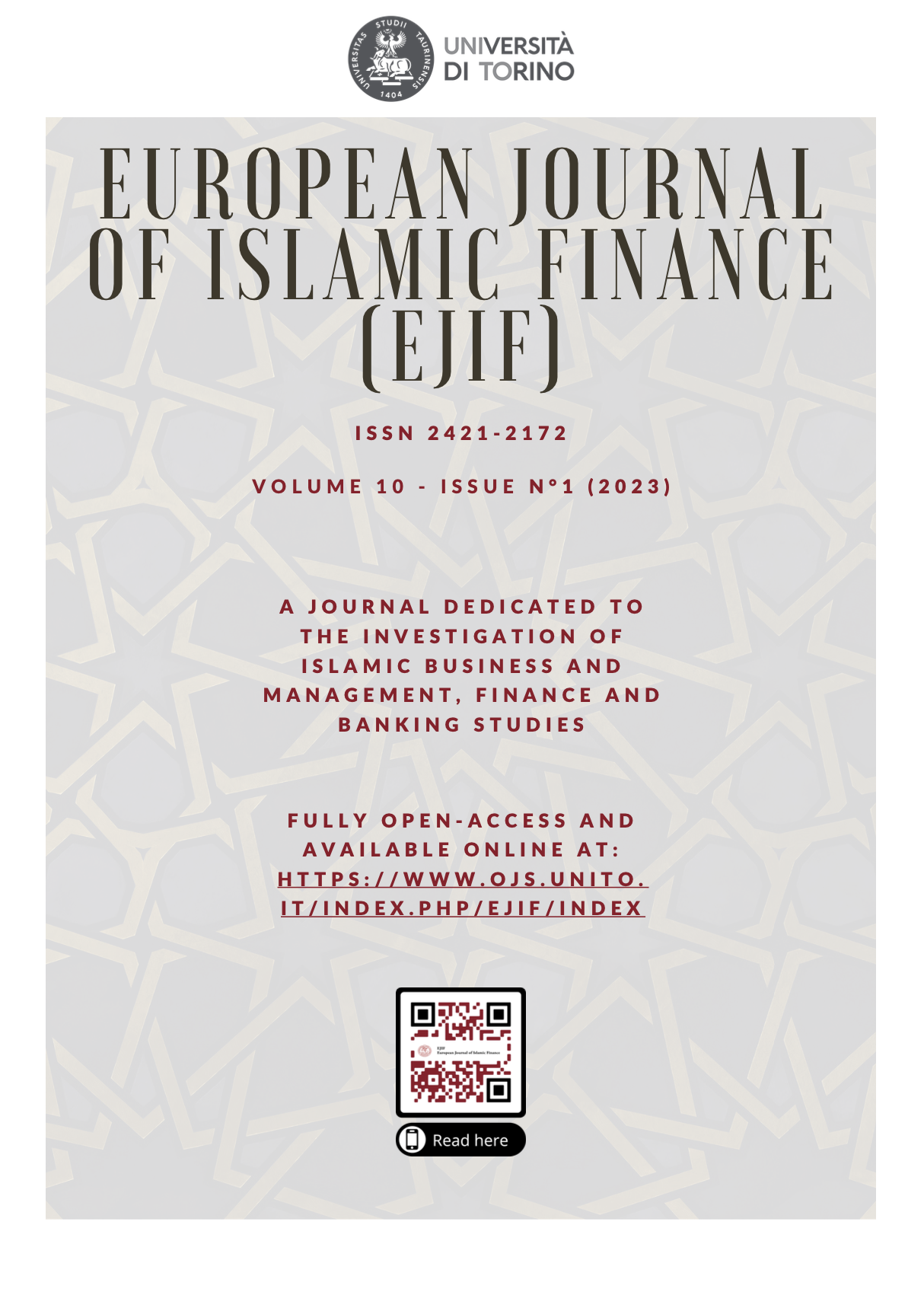GMM dependency model for Shariah and underlying indices of India during Covid-19 period
DOI:
https://doi.org/10.13135/2421-2172/7108Keywords:
Shariah Indices, GMM, NSE, Modelling, Covid-19Abstract
The National Stock Exchange of India (NSE) has presented Nifty 50 Shariah and Nifty 500 Shariah indices to provide unconventional indices for Sharia-compliant companies. These indices follow Sharia laws and can be used in portfolios that are culturally dependable commodities for investors who do not wish to put their money into the undesired business. NSE witnessed big movements in the indices during the Covid-19 period. This study seeks to understand the association between Nifty 500 Sharia and Nifty 50 Sharia and their respective selected indexes, Nifty 500 and Nifty 50, during the Covid-19 pandemic. The period from 27/01/2020 to 31/05/2022 has been taken for this study. The techniques applied, like correlation, co-integration, GMM, etc. based on the objectives of this paper. We conclude that the return of Sharia indices is better compared to the other indices. Also, stocks compliant with Sharia Indices are less risky and a better alternative for the portfolio during pandemic times.
References
Abbes, M. B. (2012). Risk and return of islamic and conventional indices. International Journal of Euro-Mediterranean Studies, 5(1), 1–23. https://doi.org/10.1007/s40321-012-0001-9
Abdullah, A. M., Saiti, B., Mansur, A., & Masih, M. (2013). The Impact of Crude Oil Price on Islamic Stock Indices of South East Asian ( SEA ) Countries : A Comparative Analysis. 2008.
Ahmad, Z., & Ibrahim, H. (2020). A Study of Performance of the KLSE Syariah Index. Malaysian Management Journal, 6, 25–34. https://doi.org/10.32890/mmj.6.1-2.2002.8594
Albaity, M., & Ahmad, R. (2008). Performance of Syariah and Composite Indices : Evidence From Bursa Malaysia. Asian Academy of Management Journal of Accounting and Finance, 4(1), 23–43.
Al-Khazali, O., Lean, H. H., & Samet, A. (2014). Do Islamic stock indexes outperform conventional stock indexes? A stochastic dominance approach. Pacific Basin Finance Journal, 28, 29–46. https://doi.org/10.1016/j.pacfin.2013.09.003
Arshad, S., & Rizvi, S. A. R. (2013). The Impact of Global Financial Shocks to Islamic Indices : Speculative Influence or Fundamental Changes ? Journal of Islamic Finance, 2(1), 1–11. https://doi.org/10.12816/0001112
Ashraf, S., & Deo, M. (2015). Non-Linear Dependence of Indian Shariah Market. Journal of Islamic Economics Banking and Finance, 10(2), 88–101. https://doi.org/10.12816/0025171
Biancone, P.P. ; Radwan, M. (2016). European Companies: Evaluation for Sharia Compliance “Opportunities and Challenges.” European Journal of Islamic Finance, 1–8. https://doi.org/http://dx.doi.org/10.13135/2421-2172/1803
Bollani, L., & Chmet, F. (2020). Bibliometric Analysis of Islamic Finance. European Journal of Islamic Finance, 19(1), 1–11. Charles, A., Darné, O., & Pop, A. (2012). Are Islamic Indexes More Volatile Than Conventional Indexes? Evidence from Dow Jones Indexes. Hal, 1–27.
Hassan, A., Antoniou, A., & Paudyal, D. K. (2005). Impact Of Ethical Screening On Investment Performance: The Case Of The Dow Jones Islamic Index. Islamic Economic Studies, 12(2), 68–97.
Hassan, K., & GIRARD, E. (2010). Faith Based Ethical Investing The Case of Dow Jones Islamic Indexes.
Irfan, M., Kassim, S., & Dhimmar, S. (2021). Impact of Covid-19 on Islamic Stock Markets: An Investigation using Threshold Volatility and Event Study Models. International Journal of Islamic Economics and Finance (IJIEF), 4(1), 121–148. https://doi.org/10.18196/ijief.v4i1.10480
Jamaluddin, N. (2013). Marketing of Shari’ah-based financial products and investments in India. Management Research Review, 36(4), 417–430. https://doi.org/10.1108/01409171311315012
Kumar, A. (2022). An Influential Interaction of Macroeconomic Variables towards Indian Sharia Stock Indices in post
COVID19 Era. June.
Siddiqui, S., & Rizvi, Z. B. (2022). Understanding Volatility dependence between MENA Sukuk, GCC Sukuk and Nifty
Shariah Index during Covid-19: A C-vine Copula Approach. European Journal of Islamic Finance, 9(1), 1–14.
https://doi.org/10.13135/2421-2172/6067
Siddiqui, S., & Sheikh, S. P. (2016). Modelling the Return of Shariah with Underlying Indices of National Stock Exchange of India: A Case of 3SLS and GMM Estimation. Journal of Emerging Economies and Islamic Research, 4(2), 6. https://doi.org/10.24191/jeeir.v4i2.9082
Siddiqui, S., & Sheikh, S. P. (2016). Modelling the Return of Shariah with Underlying Indices of National Stock Exchange of India: A Case of 3SLS and GMM Estimation. Journal of Emerging Economies and Islamic Research, 4(2), 6. https://doi.org/10.24191/jeeir.v4i2.9082
Syauqi Beik, I. (2011). the Relationship Between Jakarta Islamic Index and Other Selected Markets: Evidence from
Impulse Response Function. Majalah Ekonomi Universitas Airlangga, 2, 100–109.
Ul Haq, I. (2013). Co-Integration and Causality in Different Time Scales between Sensex and Shariah: 50 Indices in Indian Stock Markets. Journal of Islamic Economics Banking and Finance, 9(4), 164–174. https://doi.org/10.12816/0031382
Downloads
Published
How to Cite
Issue
Section
License
EJIF content is licensed under a Creative Commons Attribution 4.0 International License.
Authors keep the copyrights for their work and give the journal the work's first publication copyright, which is at the same time licensed under a Creative Commons License – Attribution, which in turn allows other parties to share the work with an acknowledgement of the work's authorship and initial publication in this journal.



 EJIF has been approved for inclusion in
EJIF has been approved for inclusion in  EJIF is a member of
EJIF is a member of  EJIF is indexed by
EJIF is indexed by  EJIF is listed in the ANVUR (Italian National Agency for the Evaluation of Universities and Research Institutes) as a scientific journal
EJIF is listed in the ANVUR (Italian National Agency for the Evaluation of Universities and Research Institutes) as a scientific journal

